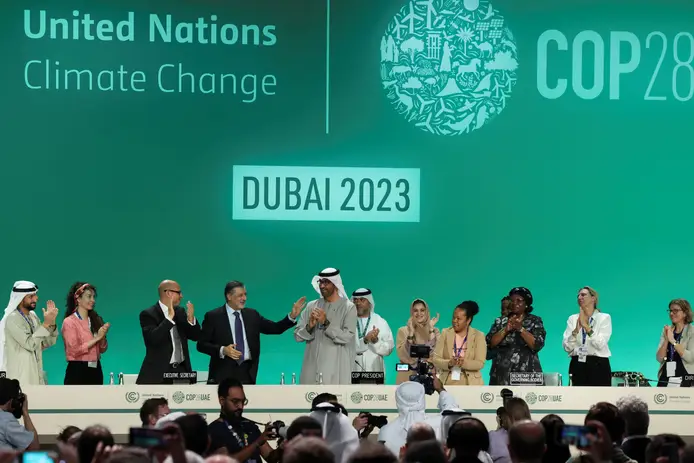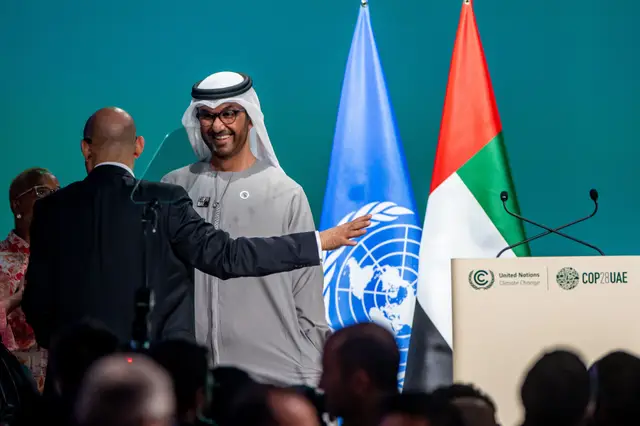COP28 Endorses a Path for the Gradual Phase-Out of Fossil Fuels

Well beyond the COP 28 deadline, representatives from over 200 countries have finally reached an historic agreement for a transition away from fossil fuels. The approved text calls for a fair, orderly, and equitable transition in energy systems, accelerating action in this crucial decade to achieve carbon neutrality by 2050 in line with scientific recommendations. The final text was reportedly approved without objection, and there was applause when COP28 President Sultan Al-Jaber announced it.
Representatives from over 200 countries reached an agreement, following two weeks of negotiations, with the aim of achieving carbon neutrality by 2050, in alignment with scientific recommendations. Despite challenges posed by conflicts in Ukraine and Israel-Hamas, the agreement was seen as a significant step. United Nations Secretary-General Guterres expressed concerns about whether the agreement might be coming too late.
UN Secretary-General Expresses Gratitude for COP28 Agreement
“From the bottom of my heart, thank you. We´ve come a long way together in a very short time. We have worked hard to ensure a better future for people and the planet. We should be proud of what we have achieved. We´ve secured a comprehensive response to reduce global emissions. We have presented a robust action plan to keep the 1.5ºC [temperature increase] goal within reach,” stated António Guterres, UN Secretary-General.
António Guterres has already responded on the social media platform X, questioning whether the agreement arrives “too late“: “Whether they like it or not, the phased elimination of fossil fuels is inevitable.”
Guterres remarked that the agreement was achieved “after many years of a blocked debate on this issue.“
“Science informs us that limiting global warming to 1.5 degrees is impossible without phasing out all fossil fuels within a time frame compatible with this limit. This reality has been acknowledged by a growing and diverse coalition of countries,” added the UN Secretary-General.
European Commissioner Highlights Significance of COP28 Agreement
Even before the official announcement of the agreement, European Commissioner for Climate, Wopke Hoekstra, expressed that the approval of the document could signal “the beginning of the end of fossil fuels”: “We are taking a very, very significant step [to limit global warming to 1.5°C],” he emphasized.

MARTIN DIVISEK
John Kerry, the US climate envoy, emphasized that while the agreement may not be flawless, everyone should commend the significant step taken, considering the challenges posed by the war in Ukraine and the Israel-Gaza conflict.
“Individuals might have articulated things differently, but I believe it’s a cause for optimism. I am impressed by the spirit of cooperation,” remarked John Kerry.

However, there were dissenting voices, particularly from activists, non-governmental organizations (NGOs), and academics present at the negotiations over the past two weeks. Some were even “shocked by the rapid overcoming of the agreement,” as reported by a BBC correspondent.
COP28 Agreement Acknowledged but Criticized for Lack of Clarity and Speed
“While this morning’s COP28 text signals clear support for the science that there is no room for fossil fuels in the future, it falls short in providing the fair scale, clarity, and speed that we really need,” emphasized Chiara Martinelli, director of the NGO European Climate Action Committee.
The COP28 agreement, for the first time, calls on all countries to abandon the use of fossil fuels by 2050. However, it does not specify a gradual elimination through targets, which was the intention of many governments and organizations.

COP28 Agreement Marks a Pivotal Shift Away from Fossil Fuels, Says Australian Representative
The representative from Australia, Chris Bowen, emphasized that the coming years will be the true test of the Paris Agreement, determining whether the world has made progress in bending the curve or lost the goal of 1.5°C. However, he highlighted the central focus of discussions on the future of fossil fuels in the energy system, stating that the world took a step forward, showing a global acknowledgment that the future lies in clean energy and signaling the end of the fossil fuel era. Bowen mentioned the affirmation of recent science on emission cuts as the basis for this outcome.

Developing Nations Stress Developed Countries’ Responsibility in COP28 Agreement
Diego Pacheco, the representative of Bolivia and spokesperson for a group of developing countries, highlighted the “historic responsibility” of the richest and most developed nations in addressing the climate crisis. He emphasized that developed countries have not taken leadership in climate action or changed their lifestyles. Pacheco pointed out that developed countries with plans to expand fossil fuels by 2050 are contradicting scientific recommendations. He expressed concern over the intensification of efforts by developed countries to evade their responsibilities, leading to a world that is increasingly unfair and unequal over the past eight years.

Developing Nations Emphasize Historic Responsibility in Climate Action
In fact, the representative of Bolivia highlighted the irony that those most responsible for the expansion of fossil fuels are now presenting themselves as champions of the “north star.” While expressing support for the declaration on the first global stocktaking, he made a reservation about common but differentiated responsibilities. Diego Pacheco received a huge round of applause in the plenary, concluding that there is a need for a paradigm shift to address the neocolonialism faced by many.

The European Union celebrated the “beginning of the end of fossil fuels,” according to its head of climate affairs, Wopke Hoekstra. Hoekstra emphasized that it took thirty years to achieve this milestone and expressed gratitude for the collaborative efforts. He highlighted the responsibility towards future generations and called for a day of “gratitude” and “silent determination.”
To conclude, Ursula von der Leyen, president of the European Commission, applauded the “historic agreement” at COP28, attributing a crucial part of it to the EU’s initiative. She noted that the entire world supported the EU’s 2030 objectives, which include tripling the use of renewable energy and doubling energy efficiency in the next six years.
Read the original article on: Expresso50










